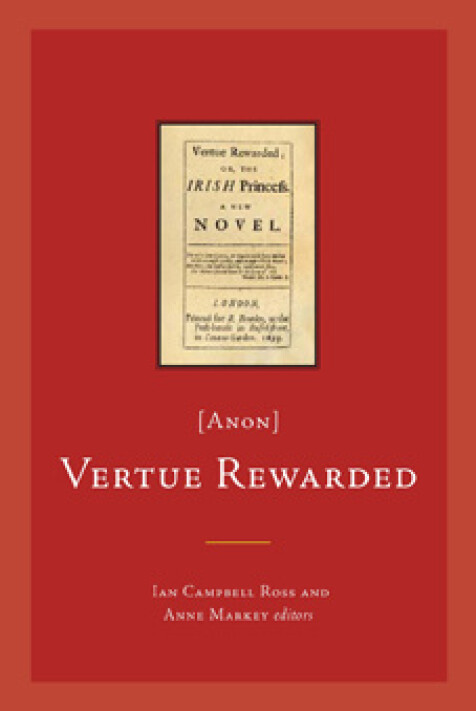Vertue rewarded; or, The Irish Princess (1693)
Ian Campbell Ross & Anne Markey, editors
‘These two handsome volumes [Irish Tales and Vertue Rewarded] launch what promises to be a most valuable and interesting series of editions of eighteenth-century Irish fiction, part of a much wider project on the literature of early modern Ireland, driven by leading scholars from around the world, and rooted in the collaborative industry of the Eighteenth-Century Literature Research Network in Ireland … These opening volumes display a very comprehensive scholarly framework, including critical introductions, richly annotated texts, extensive endnotes and select bibliographies … These two volumes are the beginning of what will become a very important and original contribution to eighteenth-century Irish studies. The editorial frameworks are of the very highest standard … The publisher has done a very elegant job in the production and presentation of these important texts, notably in the reproduction on the jackets of a reduced image of the original title-pages, set against a background of strong primary colours. These volumes would grace the shelves of any book-lover and scholar', Irish University Review (Summer 2011).
‘A sophisticated and witty story which takes on the politics of Ireland in the aftermath of the Jacobite defeat and up to William of Orange … the novel is not just an Irish one but reveals influences from abroad', Books Ireland (April 2010).
‘In the hands of expert editors, Vertue Rewarded is revealed as startingly innovative … [it] treats of the tensions between public duty and private gratification. A succinct and brilliantly illuminating introduction to this reissue by Ian Campbell Ross and Anne Markey shows that an episode from the Spanish colonization of South America recounted by Carcilaso de la Vega is blended with fake Gaelic folklore … Similar inventiveness is shown in the second text, Irish Tales, which appeared first in 1716', Toby Barnard, TLS (June 2010)
‘Ross and Markey offer an astute reading of the political and social mores of the period of the Williamite wars … They reveal Vertue Rewarded as a complex narrative that weaves together folklore, fiction, and Irish and Peruvian history … the text follows the original, and the scholarly notes do much to enhance the edition. This volume, with its detailed consideration and appendixes and notes, rescues the novel from obscurity and provides scholars with insights in the English Protestant success at Limerick and the contrast between the ascendancy and the “wild Irish”. A worthy resource for any study of the 17th and 18th centuries and the development of the novel in English … Recommended', M.H. Kealy, Choice (November 2010).
‘Presented as the first in a series devoted to early Irish fiction between 1680 and 1820, both Vertue Rewarded (1693) and Irish Tales (1716) anticipate important developments in the novel form. Both are genuinely, even startlingly innovative, and based on these fine editions they will demand the attention of scholars and students across a variety of fields, including Irish literature, eighteenth-century literature, and the novel … These novels have found their ideal editors, whom I commend for producing what can only be described as exemplary editions. The introductions are perfectly judged, providing the right balance of information, much of which is the result of painstaking original research, with critical and interpretative frameworks that situate the texts and our responses to them squarely at the heart of the very latest state of knowledge on the novel and late seventeenth-century and eighteenth-century culture. The editorial notes are similarly precise and useful, and the texts themselves are presented in a highly readable format, with notes on any necessary modernizations or corrections. Readers are also provided with select bibliographies to facilitate their own further reading and research. The result of this impressive synthesis of textual and bibliographical scholarship with sophisticated and nuanced interpretative models is the transformation of these novels from little-known curiosities to texts that demand serious attention. These editions make a case for locating the origin of Irish fiction at the point of origin of the novel itself: as romance was giving way to the novel, print culture was assuming its central social significance, and the stories of the private lives of individuals were becoming an acceptable subject for literature. In the case of these early Irish novels, these themes and contexts are accompanied by an arresting awareness of the fate of conquered people and the potential of the powerful yet still emergent form of the novel to incorporate layers of cultural history and to give narrative form to the complex interactions between European countries and distant colonial locations’, Clíona Ó Gallchoir, Eighteenth-Century Fiction (March 2011).

